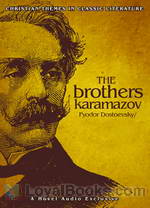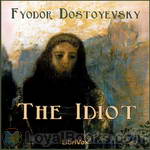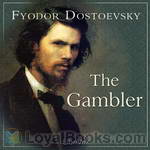|
Books Should Be Free Loyal Books Free Public Domain Audiobooks & eBook Downloads |
|
|
Books Should Be Free Loyal Books Free Public Domain Audiobooks & eBook Downloads |
|
Top Authors |
|---|
|
Book type:
Sort by:
|
By: Anthony Trollope (1815-1882) | |
|---|---|
 An Old Man's Love
An Old Man's Love
This was Trollope's last completed novel, and he may have acquired his sympathy for older lovers with age! A not-so-very-old man, Mr. Whittlestaff, dearly loves Mary Lawrie, the girl he provides a home for after her father's death. He wishes to marry her, and she reluctantly accepts him, but warns him of her deep regard for a young man she had known years earlier. That Mr. Gordon had not exactly engaged her, but had gone off to seek his fortune and had not communicated with Mary ever since. Shortly after Mary accepts Mr. Whittlestaff, Gordon shows up. Trollope works out a final arrangement which resolves the quandary, but not with comfort. (Arnold Banner) | |
 An Unprotected Female at the Pyramids
An Unprotected Female at the Pyramids
| |
 North America — Volume 1
North America — Volume 1
| |
 Macdermots of Ballycloran
Macdermots of Ballycloran
This is the story of the Macdermots of Ballycloran the story is about the tragic demise of a landowning family. Larry Macdermot lives in a dilapidated mansion in Co. Leitrim, whose mortgage to Joe Flannelly he cannot keep up. Enmity between the Macdermot and Flannelly families is sharpened by son Thady's having declined to marry Joe Flannelly's daughter, Sally. Macdermot's daughter, Feemy, is herself seduced by the locally hated English police officer, Captain Myles Ussher. This was Trollope's first published novel, which he began in September 1843 and completed by June 1845. However, it was not published until 1847. | |
 Marion Fay
Marion Fay
Marion Fay (1882) offers a pair of romances, each involving a match between one titled personage and one commoner. The misalliances lead to the typical strains between parental desires and romantic wishes of the young. The novel’s primary characters have such noble dispositions that Trollope was impelled to create several far more interesting minor characters who either threaten mayhem or provide amusing diversions. | |
 The Courtship of Susan Bell
The Courtship of Susan Bell
| |
 The Mistletoe Bough
The Mistletoe Bough
| |
 The Man Who Kept His Money in a Box
The Man Who Kept His Money in a Box
| |
 Struggles of Brown, Jones, and Robinson
Struggles of Brown, Jones, and Robinson
Billed as a satire concerning the dishonest advertising and business practices of the day, it tells the tale of an upstart clothing business doomed from the get-go to utter failure. Its senior partner (the elderly Brown, who provides the investment) is far too timid for business. His son-in-law (Jones, who runs the store) is stealing from the till, and the junior partner, Robinson (who writes advertisements for the store) is so obsessed with the idea that advertising alone will drive the business, he uses up every last penny of the capital investment in a series of increasingly ludicrous ad campaigns and publicity stunts... | |
 The Kellys and the O'Kellys
The Kellys and the O'Kellys
| |
 Hunting Sketches
Hunting Sketches
| |
 The Parson's Daughter of Oxney Colne
The Parson's Daughter of Oxney Colne
| |
 A Ride Across Palestine
A Ride Across Palestine
| |
 Ralph the Heir
Ralph the Heir
As usual, Trollope creates a nice variety of characters of different English classes, sentiments and positions. The primary themes are the inheritance of property, extravagance or reason in the spending of assets, the mating of young people, and the electoral practices of the time. The election chapters are based on Trollope's own experiences when he ran for Parliament.There are, of course, many subplots which allow Trollope to express, through dialog, his opinions about greed, snobbery, work ethics and dandyism... | |
 Thackeray
Thackeray
| |
 Nina Balatka
Nina Balatka
A romance set in Prague between a Catholic and a Jew. In this short novel, Trollope moves away from his usual milieu to explore a theme which has universal resonance. | |
 Returning Home
Returning Home
| |
 Miss Sarah Jack of Spanish Town, Jamaica
Miss Sarah Jack of Spanish Town, Jamaica
| |
 Chateau of Prince Polignac
Chateau of Prince Polignac
| |
 Relics of General Chasse
Relics of General Chasse
| |
 The House of Heine Brothers
The House of Heine Brothers
| |
 La Mere Bauche
La Mere Bauche
| |
 John Bull on the Guadalquivir
John Bull on the Guadalquivir
| |
 O'Conors of Castle Conor
O'Conors of Castle Conor
| |
 Mrs. General Talboys
Mrs. General Talboys
| |
 George Walker at Suez
George Walker at Suez
| |
 La Vendée
La Vendée
| |
By: Fyodor Dostoyevsky (1821-1881) | |
|---|---|
 Crime and Punishment
Crime and Punishment
A mysterious crime is being plotted in a tiny garret above a dilapidated apartment building in St Petersburg in Russia. The plotter, Rodion Raskolinikov, is a poor student who has delusions of ridding the world of “worthless vermin” and counter balancing these crimes with good deeds. He commits a murder to test his own theories and prove that crime comes naturally to the human species. Crime and Punishment is a path-breaking novel of ideas that changed the course of novel writing in the 20th century... | |
 Notes from the Underground
Notes from the Underground
One of the earliest polished examples of existential literature, Notes from the Underground follows the life of a recluse and depicts his antagonistic attitude toward society. Written in two parts with a first person narration, the novella explores various themes expressing the misleading notion of rationalism and utopianism, existentialism, alienation and human inaction. The psychological novel begins with a monologue in which the protagonist introduces and characterizes himself. Referred... | |
 The Brothers Karamazov
The Brothers Karamazov
Set in 19th century Russia, The Brothers Karamazov (Russian: Братья Карамазовы) is the last novel written by the illustrious author Fyodor Dostoyevsky who died a few months before the book's publication. The deeply philosophical and passionate novel tells the story of Fyodor Karamazov, an immoral debauch whose sole aim in life is the acquisition of wealth. Twice married, he has three sons whose welfare and upbringing, he cares nothing about. At the beginning of the story, Dimitri Karamazov, the eldest son who is now a twenty-eight year old war veteran, returns to his home town to claim the inheritance left to him by his dead mother... | |
 The Idiot
The Idiot
The extraordinary child-adult Prince Myshkin, confined for several years in a Swiss sanatorium suffering from severe epilepsy, returns to Russia to claim his inheritance and to find a place in healthy human society.The teeming St Petersburg community he enters is far from receptive to an innocent like himself, despite some early successes and relentless pursuit by grotesque fortune-hunters. His naive gaucheries give rise to extreme reactions among his new acquaintance, ranging from anguished protectiveness to mockery and contempt... | |
 The Gambler
The Gambler
The Gambler is a short novel by Fyodor Dostoevsky about a young tutor in the employment of a formerly wealthy Russian general. The novella reflects Dostoevsky's own addiction to roulette, which was in more ways than one the inspiration for the book: Dostoevsky completed the novella under a strict deadline so he could pay off gambling debts. | |